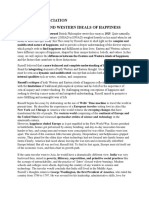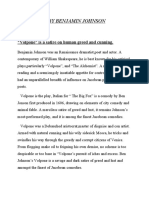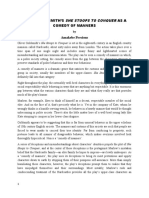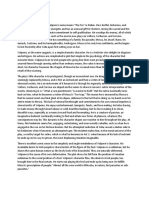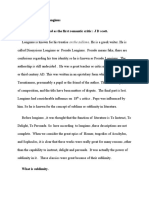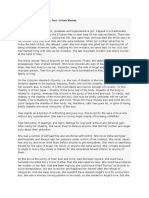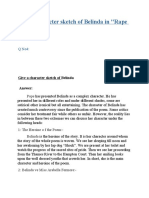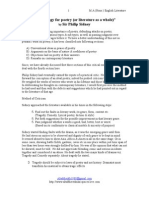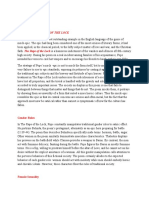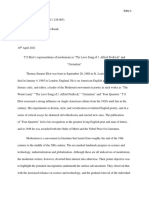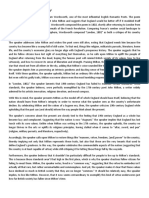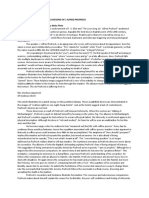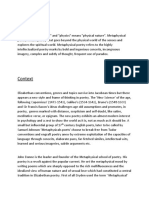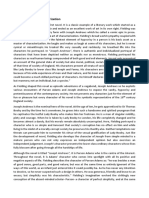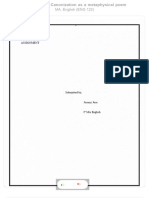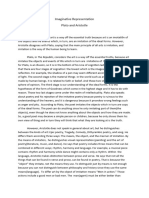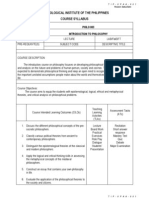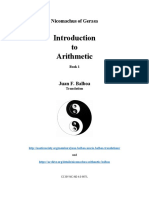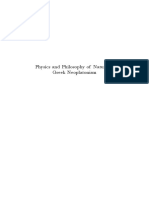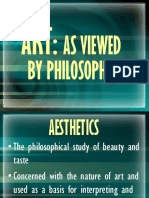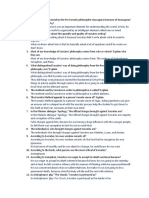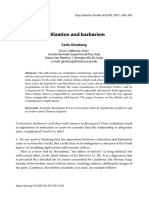Professional Documents
Culture Documents
Aristotles Concept of Mimesis
Aristotles Concept of Mimesis
Uploaded by
Jannatul Nayma MouOriginal Description:
Original Title
Copyright
Available Formats
Share this document
Did you find this document useful?
Is this content inappropriate?
Report this DocumentCopyright:
Available Formats
Aristotles Concept of Mimesis
Aristotles Concept of Mimesis
Uploaded by
Jannatul Nayma MouCopyright:
Available Formats
Aristotle's views on Mimesis
Mimesis is a Greek term that means imitation. The first step in understanding Aristotle's account
of mimesis is remembering that he spent many years studying at Plato's Academy. In Platonic
thought, the things we encounter via our senses, the phenomena, are imitations of ideal forms.
Art (whether poetry or painting), in imitating the phenomena, is thus merely an imitation of an
imitation. Plato also divides imitation by medium (words, paint, marble, etc.). He further divides
the verbal techniques of imitation into pure imitation or mimesis, in which an actor impersonates
a character on stage, and diegesis, or narration, in which a narrator speaks in the third person
about events. Epic is a mixed form, using both impersonation and narration when performed by a
rhapsode. Plato tends to condemn imitation as degrading, because (1) impersonation can
inculcate bad or non-rational habits and (2) because it focuses attention on mere phenomena.
Aristotle accepts the Platonic distinction between mimesis and diegesis, but finds both valuable
as modes of training and educating emotions. Ontologically, he does not believe in separated
forms, but argues that forms in here in phenomena, and thus the only way to understand concepts
or qualities is as they are embodied and thus advocates rather than objects to close study of
appearances.
For Aristotle, mimesis is a natural human activity. He agrees with Plato that children learn by
imitation. While Plato worried that people observing villains or despicable characters in poetry
would imitate them, Aristotle believes that bad examples teach people how not to behave just as
good examples teach people how to behave.
Aristotle's theory of imitation:
• Mimesis is manifested in 'particulars' which resemble or imitate the forms from which
they are derived.
• Thus, the mimetic world (the world of representation) is inferior for it consists of
imitations which will always be subordinate to their original.
• Mimetic activity produces appearances and illusions that affect the perception and
behavior of people.
Aristotle’s Concept of Mimesis:
• Mimesis, a "natural" human inclination described as "inherent in man from his earliest
days.
• A fundamental expression of human experience within the world - a means of learning
about nature that, through the perceptual experience, allow us to get closer to the "real".
• Mimesis not only functions to re-create existing objects or them.
• Mimesis creates a fictional world of representation in which there is no capacity for a
non-mediated relationship to reality.
You might also like
- Age of Propaganda - Anthony R Pratkanis, Elliot AronsonDocument310 pagesAge of Propaganda - Anthony R Pratkanis, Elliot Aronsonpibepaz100% (8)
- Eastern and Western Ideals of HappinessDocument4 pagesEastern and Western Ideals of HappinessSyeda Rida Zahra100% (2)
- 3 Waves of PlatoDocument21 pages3 Waves of PlatoIrah Kyle Zapanta100% (4)
- Robin George Collingwood - The Principles of Art - The Clarendon Press (1945)Document358 pagesRobin George Collingwood - The Principles of Art - The Clarendon Press (1945)Guille Lara Bolaños KandinskyNo ratings yet
- The Effects of Paradoxes in CanonizationDocument2 pagesThe Effects of Paradoxes in CanonizationBhagyalaxmi Das100% (7)
- Epic Features in The IliadDocument3 pagesEpic Features in The IliadHarisadhan GhoshNo ratings yet
- Memisis of AristotleDocument2 pagesMemisis of AristotleHamayun KhanNo ratings yet
- Volpone:By Benjamin Johnson: "Volpone" Is A Satire On Human Greed and CunningDocument3 pagesVolpone:By Benjamin Johnson: "Volpone" Is A Satire On Human Greed and CunningAlphahin 170% (1)
- Aristotle's Concept of Ideal Tragic HeroDocument3 pagesAristotle's Concept of Ideal Tragic HeroRazwan Shahad100% (2)
- 'On National Prejudices' Oliver GoldsmithDocument5 pages'On National Prejudices' Oliver GoldsmithSmriti Thakur100% (2)
- Shayeari - Duttathe Void, Muktibodh2021!02!19sem 5, Dse-A1, The VoidDocument5 pagesShayeari - Duttathe Void, Muktibodh2021!02!19sem 5, Dse-A1, The VoidDarshana Roy100% (1)
- On The Value of Scepticism Literary AnalysisDocument3 pagesOn The Value of Scepticism Literary AnalysisSyeda Rida Zahra100% (2)
- Oliver Goldsmith'S She Stoops To Conquer As A Comedy of MannersDocument3 pagesOliver Goldsmith'S She Stoops To Conquer As A Comedy of MannersAkpevweOghene Peace50% (2)
- The White Devil Revenge TragedyDocument2 pagesThe White Devil Revenge TragedyAnanya Ray100% (1)
- Wordsworth As Poet of NatureDocument4 pagesWordsworth As Poet of NatureSimi Bot100% (3)
- Congreve's Use of Wit and Humour. SH CDocument3 pagesCongreve's Use of Wit and Humour. SH CShahnawaz Hussain100% (1)
- Fire and Rain Notes 1Document7 pagesFire and Rain Notes 1bfh88j18100% (2)
- Theme of ResurrectionDocument3 pagesTheme of ResurrectionFaisal JahangeerNo ratings yet
- Character Sketch of OedipusDocument2 pagesCharacter Sketch of OedipusSr Chandrodaya J100% (1)
- Hamlet As TragedyDocument3 pagesHamlet As TragedyAngélica SantiNo ratings yet
- The Faerie Queene by Edmund Spenser As An AllegoryDocument2 pagesThe Faerie Queene by Edmund Spenser As An AllegoryBint e AshrafNo ratings yet
- Characters in VolponeDocument6 pagesCharacters in VolponeOmar Khalid ShohagNo ratings yet
- On The Sublime: Longinus Longinus Is Regarded As The First Romantic Critic: J D ScottDocument6 pagesOn The Sublime: Longinus Longinus Is Regarded As The First Romantic Critic: J D ScottManu James0% (1)
- Resolution and Independence - WordsworthDocument10 pagesResolution and Independence - WordsworthTanmai NaiduNo ratings yet
- Role of The Four Tempters in The PlayDocument4 pagesRole of The Four Tempters in The Playhasnain0% (1)
- Wordsworth's Conception of PoetryDocument3 pagesWordsworth's Conception of Poetryfaisal jahangeerNo ratings yet
- Eunice de SouzaDocument3 pagesEunice de SouzaManya ShivendraNo ratings yet
- Major AssignmentDocument9 pagesMajor AssignmentMuhammad FarazNo ratings yet
- Emperor Jones As A Tragic DramaDocument7 pagesEmperor Jones As A Tragic DramaRanga Sriram80% (5)
- "Hero As Poet" in "On Heroes, Hero - Worship, and The Heroic in History" by Thomas Carlyle.Document3 pages"Hero As Poet" in "On Heroes, Hero - Worship, and The Heroic in History" by Thomas Carlyle.BILAL AHMAD100% (1)
- Tess of The D'Urbervilles: Tess - A Pure WomanDocument2 pagesTess of The D'Urbervilles: Tess - A Pure WomanCh M Naeem UllahNo ratings yet
- Give A Character Sketch of Belinda inDocument4 pagesGive A Character Sketch of Belinda inElena AiylaNo ratings yet
- Proviso Scene in The Way of The WorldDocument3 pagesProviso Scene in The Way of The WorldEsther León JorgeNo ratings yet
- Bacon Renaissance and Machiavellian Approach.Document3 pagesBacon Renaissance and Machiavellian Approach.Mehar Waqas JavedNo ratings yet
- Animal Imagery in VolponeDocument2 pagesAnimal Imagery in Volponegilijan67% (15)
- Sir Philip Sidney's Remark On His ContemporariesDocument3 pagesSir Philip Sidney's Remark On His ContemporariesAltaf SheikhNo ratings yet
- Autobiographical Note in Dr. FaustusDocument2 pagesAutobiographical Note in Dr. FaustusSaleem Raza100% (4)
- Themes of The Rape of The LockDocument3 pagesThemes of The Rape of The Lockpak updatesNo ratings yet
- T.S Eliot's Representation of Modernism in "The Love Song of J. Alfred Prufrock" and "Gerontion"Document13 pagesT.S Eliot's Representation of Modernism in "The Love Song of J. Alfred Prufrock" and "Gerontion"Daisy rahmanNo ratings yet
- Philip Sidney Defends Poetry in His EssayDocument3 pagesPhilip Sidney Defends Poetry in His EssayAreebaKhalid100% (2)
- Critical Appreciation of "London, 1802"Document2 pagesCritical Appreciation of "London, 1802"Abdur Rob100% (1)
- Waiting For Godot - EditedDocument5 pagesWaiting For Godot - Editedrupal aroraNo ratings yet
- Ideas That Have Helped MankindDocument9 pagesIdeas That Have Helped Mankindhasnain50% (2)
- Preface To The Lyrical Ballads Is An EpochDocument6 pagesPreface To The Lyrical Ballads Is An Epochfaisal jahangeerNo ratings yet
- Ts Eliot As A Literary CriticDocument3 pagesTs Eliot As A Literary CriticJuma GullNo ratings yet
- Joseph Andrews.: A Study of Digression As A Narrative Technique in Henry Fielding'sDocument3 pagesJoseph Andrews.: A Study of Digression As A Narrative Technique in Henry Fielding'sSAIMOONNo ratings yet
- Jonathan Swift As A SatiristDocument5 pagesJonathan Swift As A SatiristZeeshan ch 'Hadi'100% (1)
- Hamlet As A Revege TragedyDocument5 pagesHamlet As A Revege Tragedyجاوید اقبال صدیقیNo ratings yet
- The Mill On The FossDocument5 pagesThe Mill On The FossDanyal Khan100% (1)
- Interior Monologue in The Love Song of J Alfred PrufrockDocument2 pagesInterior Monologue in The Love Song of J Alfred PrufrockNinto Chakraborty100% (2)
- Christy Mahon As A Comic Hero in The Playboy of The Western WorldDocument2 pagesChristy Mahon As A Comic Hero in The Playboy of The Western Worldsaintmasud80% (10)
- John Donne and Metaphysical PoetryDocument9 pagesJohn Donne and Metaphysical PoetrySakin Ahmed Sejan100% (1)
- Fielding's Art of CharacterizationDocument3 pagesFielding's Art of CharacterizationHafsa Shabbir75% (4)
- 1) Evaluation of Waiting For Godot As An Absurdist Play: The Characteristics of Absurdist Drama Plot and StructureDocument17 pages1) Evaluation of Waiting For Godot As An Absurdist Play: The Characteristics of Absurdist Drama Plot and StructureRifa Kader DishaNo ratings yet
- Things Fall Apart As A Tragedy of OkonkwoDocument7 pagesThings Fall Apart As A Tragedy of OkonkwoNawami MukhiaNo ratings yet
- The Love Song of J. Alfred Prufrock, A Critical AnalysisDocument2 pagesThe Love Song of J. Alfred Prufrock, A Critical AnalysisBaloch Karawan60% (5)
- Plot Is The Soul of Tragedy: One of The Aristotelian Constituent Parts of Tragedy From "Poetics"Document3 pagesPlot Is The Soul of Tragedy: One of The Aristotelian Constituent Parts of Tragedy From "Poetics"AreebaNo ratings yet
- Dr. Faustus As A TragedyDocument5 pagesDr. Faustus As A Tragedyrabia100% (3)
- Female Representations Gulliver'StravelsDocument6 pagesFemale Representations Gulliver'StravelsLuis Muñoz100% (3)
- The Rape of The Lock - A Social SatireDocument1 pageThe Rape of The Lock - A Social SatireAbdulRehman75% (16)
- Assignment Canonization As A Metaphysical Poem - CompressDocument9 pagesAssignment Canonization As A Metaphysical Poem - CompressbozNo ratings yet
- AristotleDocument5 pagesAristotlemhaytham093No ratings yet
- Plato and Aristotle ImitationDocument2 pagesPlato and Aristotle Imitationmohamad louisNo ratings yet
- Understanding The Self LESSON 1Document23 pagesUnderstanding The Self LESSON 1Nicaela MaderazoNo ratings yet
- Niemeyer Reason - FaithDocument11 pagesNiemeyer Reason - Faithtinman2009No ratings yet
- 2 Module Branches of PhiloDocument21 pages2 Module Branches of PhiloCila Mie AbamongaNo ratings yet
- PHL200 SylabusDocument3 pagesPHL200 Sylabus3thoNo ratings yet
- Technological Institute of The Philippines Course Syllabus: PHILO 003 Introduction To PhilosophyDocument3 pagesTechnological Institute of The Philippines Course Syllabus: PHILO 003 Introduction To PhilosophytipqccagssdNo ratings yet
- A Greek Critic: Demetrius On StyleDocument181 pagesA Greek Critic: Demetrius On StyleGhostNo ratings yet
- Nicomachus Arithmetic Balboa Book01 2018-06-12Document84 pagesNicomachus Arithmetic Balboa Book01 2018-06-12NerdwerferNo ratings yet
- Aristotle On The Homonymy of BeingDocument37 pagesAristotle On The Homonymy of BeingmacarenaNo ratings yet
- Articulation and The Origins of Proportion in Archaic and Classical GreeceDocument356 pagesArticulation and The Origins of Proportion in Archaic and Classical GreeceVoislavNo ratings yet
- Unit 1 - Humanities - Misconceptions, Humanity & Humanism & CultureDocument17 pagesUnit 1 - Humanities - Misconceptions, Humanity & Humanism & CultureFreaky TeslaNo ratings yet
- Theory Is An Explanation Given To Explain Certain RealitiesDocument7 pagesTheory Is An Explanation Given To Explain Certain Realitiestaizya cNo ratings yet
- PhA 115 - Chiaradonna, Trabattoni (Eds.) - Physics and Philosophy of Nature in Greek Neoplatonism PDFDocument328 pagesPhA 115 - Chiaradonna, Trabattoni (Eds.) - Physics and Philosophy of Nature in Greek Neoplatonism PDFPhilosophvs Antiqvvs0% (1)
- Plato TheoryDocument3 pagesPlato TheoryAsma ParvezNo ratings yet
- PHL 1b-Ethic Module 10Document6 pagesPHL 1b-Ethic Module 10yoshykaa031No ratings yet
- Dissensus: On Politics and AestheticsDocument23 pagesDissensus: On Politics and AestheticsContinuum100% (3)
- PhiloDocument35 pagesPhiloRonald Allan caballesNo ratings yet
- Part I, IntroductionDocument27 pagesPart I, IntroductionAudrey Mariel CandorNo ratings yet
- Annexure-52. MA Philosophy (REVISED)Document212 pagesAnnexure-52. MA Philosophy (REVISED)Aditya TripathiNo ratings yet
- Questions Philosophy 2Document3 pagesQuestions Philosophy 2kata kataNo ratings yet
- Article Richard Kraut Are There Natural Rights in AristotleDocument21 pagesArticle Richard Kraut Are There Natural Rights in AristotleJosé Alberto MartinsNo ratings yet
- Test Bank For An Introduction To The History of Psychology 6th Edition by B R HergenhahnDocument27 pagesTest Bank For An Introduction To The History of Psychology 6th Edition by B R HergenhahnRobert Lamon100% (45)
- Module in Gender and SocietyDocument70 pagesModule in Gender and SocietyJericho MartinNo ratings yet
- Graduate Studies & Applied Research: PlatoDocument2 pagesGraduate Studies & Applied Research: PlatoJoanne Ragudos-AbetoNo ratings yet
- 1 Cor - Concerning Peri deDocument29 pages1 Cor - Concerning Peri de31songofjoyNo ratings yet
- Carlo Ginzburg - Civilization and BarbarismDocument14 pagesCarlo Ginzburg - Civilization and BarbarismKarol LeśniakNo ratings yet
- A. G. Long-Plato and The Stoics-Cambridge University Press (2013)Document212 pagesA. G. Long-Plato and The Stoics-Cambridge University Press (2013)Toshio Takyhara100% (3)
- Eternal Torment or The Second Death, The Indictment of Eternal TormentDocument219 pagesEternal Torment or The Second Death, The Indictment of Eternal Tormentaa987654321100% (2)

